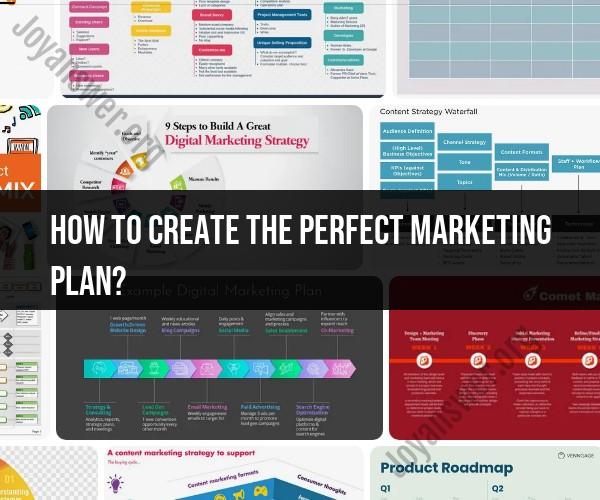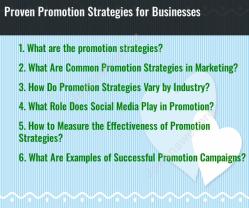How to create the perfect marketing plan?
Creating the perfect marketing plan requires a structured approach that aligns with your business goals and target audience. While perfection may be elusive, following best practices can help you create a robust and effective marketing plan. Here are the key steps to crafting a successful marketing plan:
Set Clear Objectives:Start by defining your marketing objectives. What do you want to achieve with your marketing efforts? Objectives should be specific, measurable, achievable, relevant, and time-bound (SMART).
Know Your Target Audience:Understand your ideal customers' demographics, psychographics, needs, and pain points. Create buyer personas to help you tailor your marketing efforts to their preferences.
Market Research:Gather data on market trends, competitors, and consumer behavior. Use tools like surveys, focus groups, and analytics to inform your strategies.
SWOT Analysis:Evaluate your organization's strengths, weaknesses, opportunities, and threats. This analysis helps you make informed decisions about your marketing strategies.
Positioning and Differentiation:Determine your unique selling proposition (USP) and identify how you will position your products or services in the market to stand out from the competition.
Marketing Mix (4Ps or 7Ps):Define your product, price, place (distribution), and promotion strategies. Consider additional Ps like people, processes, and physical evidence for service-based businesses.
Content Strategy:Create a content plan that outlines the type of content you'll produce, where you'll share it, and how it aligns with your goals and audience.
Digital Marketing:Develop a comprehensive digital marketing strategy, which may include social media, email marketing, content marketing, search engine optimization (SEO), pay-per-click advertising, and more.
Traditional Marketing:Don't overlook traditional marketing channels like print advertising, direct mail, events, and radio/TV if they align with your target audience.
Budget and Resource Allocation:Determine how much you're willing to invest in your marketing efforts and allocate resources accordingly. Ensure your budget supports your objectives.
Timeline and Milestones:Create a detailed schedule for your marketing activities. Establish milestones to track progress and adjust your strategies as needed.
Measurement and Analytics:Identify key performance indicators (KPIs) and set up tracking systems to measure the success of your marketing campaigns. Regularly analyze data and adjust your plan based on results.
Testing and Optimization:Continuously test different marketing approaches and optimize based on what works best. A/B testing can help refine your strategies.
Team Roles and Responsibilities:Clearly define who is responsible for each aspect of your marketing plan. Ensure everyone understands their roles and how they contribute to the overall objectives.
Contingency Planning:Be prepared for unexpected challenges. Develop contingency plans to address issues that may arise during your marketing campaigns.
Legal and Ethical Considerations:Ensure that your marketing efforts comply with all relevant laws and ethical standards, such as data privacy regulations (e.g., GDPR) and advertising guidelines.
Regular Review and Reporting:Schedule regular reviews to assess the effectiveness of your marketing plan and report to stakeholders. Use these insights to refine your strategy over time.
Adaptability:Markets are dynamic, so be ready to adapt your plan in response to changing circumstances, emerging trends, or shifts in customer behavior.
Remember that no marketing plan is truly "perfect," as it needs to be flexible and adaptable to evolving conditions. Regularly assess your results, gather feedback, and be willing to adjust your strategies to meet your objectives and better serve your target audience.
Crafting the Perfect Marketing Plan: Steps and Essentials
The following are some steps and essentials for crafting the perfect marketing plan:
- Define your goals and objectives. What do you want to achieve with your marketing plan? Do you want to increase brand awareness, generate leads, or drive sales? Once you know your goals, you can develop strategies and tactics to achieve them.
- Research your target market. Who are you trying to reach with your marketing messages? What are their needs and wants? What are their pain points? The more you know about your target market, the better you can tailor your marketing messages to resonate with them.
- Analyze your competition. Who are your competitors? What are they doing well? What are they doing poorly? How can you differentiate your business from the competition?
- Develop your marketing strategy. This is your high-level plan for how you will achieve your marketing goals. It should include your target market, your unique selling proposition (USP), and your marketing channels.
- Create a marketing budget. How much money do you have to spend on marketing? It's important to be realistic about your budget and to allocate your resources wisely.
- Develop marketing tactics. These are the specific actions you will take to implement your marketing strategy. For example, your marketing tactics might include creating a website, running social media ads, or attending industry events.
- Measure and track your results. Once you start implementing your marketing plan, it's important to track your results so you can see what's working and what's not. This will help you to refine your plan over time.
Building an Effective Marketing Strategy for Your Business
An effective marketing strategy is essential for any business that wants to succeed. It helps you to identify your target market, develop a unique selling proposition, and choose the right marketing channels to reach your target audience.
Here are some tips for building an effective marketing strategy:
- Start by defining your target market. Who are you trying to reach with your marketing messages? What are their needs and wants? What are their pain points?
- Develop a unique selling proposition (USP). What makes your business different from the competition? Why should customers choose you over your competitors?
- Choose the right marketing channels. Where does your target audience spend their time? What marketing channels are they most likely to engage with?
- Create a marketing calendar. This will help you to plan and schedule your marketing activities.
- Measure and track your results. It's important to track your marketing results so you can see what's working and what's not. This will help you to refine your strategy over time.
Elements of a Successful Marketing Plan
A successful marketing plan should include the following elements:
- Executive summary: This is a brief overview of your marketing plan that includes your goals, objectives, target market, and marketing strategies.
- Company overview: This section provides a more detailed overview of your business, including your products or services, your target market, and your competitive landscape.
- Marketing goals and objectives: What do you want to achieve with your marketing plan? Do you want to increase brand awareness, generate leads, or drive sales?
- Target market: Who are you trying to reach with your marketing messages? What are their needs and wants? What are their pain points?
- Marketing strategies: How will you achieve your marketing goals and objectives? This section should include your marketing channels, your messaging strategy, and your content strategy.
- Marketing tactics: These are the specific actions you will take to implement your marketing strategies. For example, your marketing tactics might include creating a website, running social media ads, or attending industry events.
- Marketing budget: How much money do you have to spend on marketing?
- Timeline: When will you implement your marketing plan?
- Metrics for success: How will you measure the success of your marketing plan?
Case Studies of Brands with Exceptional Marketing Plans
Here are a few case studies of brands with exceptional marketing plans:
- Nike: Nike is a master of storytelling and emotional marketing. Its campaigns often feature inspiring athletes and stories that resonate with its target audience.
- Apple: Apple is known for its minimalist and elegant marketing campaigns that focus on the company's products and their benefits.
- Coca-Cola: Coca-Cola has created some of the most iconic and recognizable marketing campaigns of all time. Its campaigns are often fun, upbeat, and family-friendly.
- Disney: Disney is another brand that is known for its storytelling and emotional marketing. Its campaigns often feature beloved characters and stories from its movies and TV shows.
The Continuous Evolution of Your Marketing Plan
Your marketing plan should not be a static document. It











